Workshop on the role of Information and Communication Technology (ICT) in public services in Cambodia
Open Development Cambodia (ODC) in collaboration with STAR Kampuchea and Cambodian Center for Independent Media (CCIM) arranged a workshop entitled “Role of Information and Communication Technology (ICT) in Public Services in Cambodia” under financial support by the Swedish Program for ICT in Developing Regions (SPIDER) on 12 March 2019 at Sunway Hotel. The workshop was attended by about 40 participants from Deutsche Gesellschaft für Internationale Zusammenarbeit Gmb (GIZ), CAF, Kampuchean Action for Primary Education (KAPE), STAR Kampuchea, CCIM, reporters from Voice of America (VOA), VOD Hot News, CNC Hot News, and Phnom Penh Post, Paññāsāstra University of Cambodia (PUC), SILIKA, FHI360 Cambodia, Aide et Action International Cambodia (AeAI), Real-Time Data Solutions, GoGreen Cambodia, Ministry of Public Work and Transport, Ministry of Civil Services, Ministry of Posts and Telecommunications, and National Committee for sub-national Democratic Development Secretariat (S-NCDD).
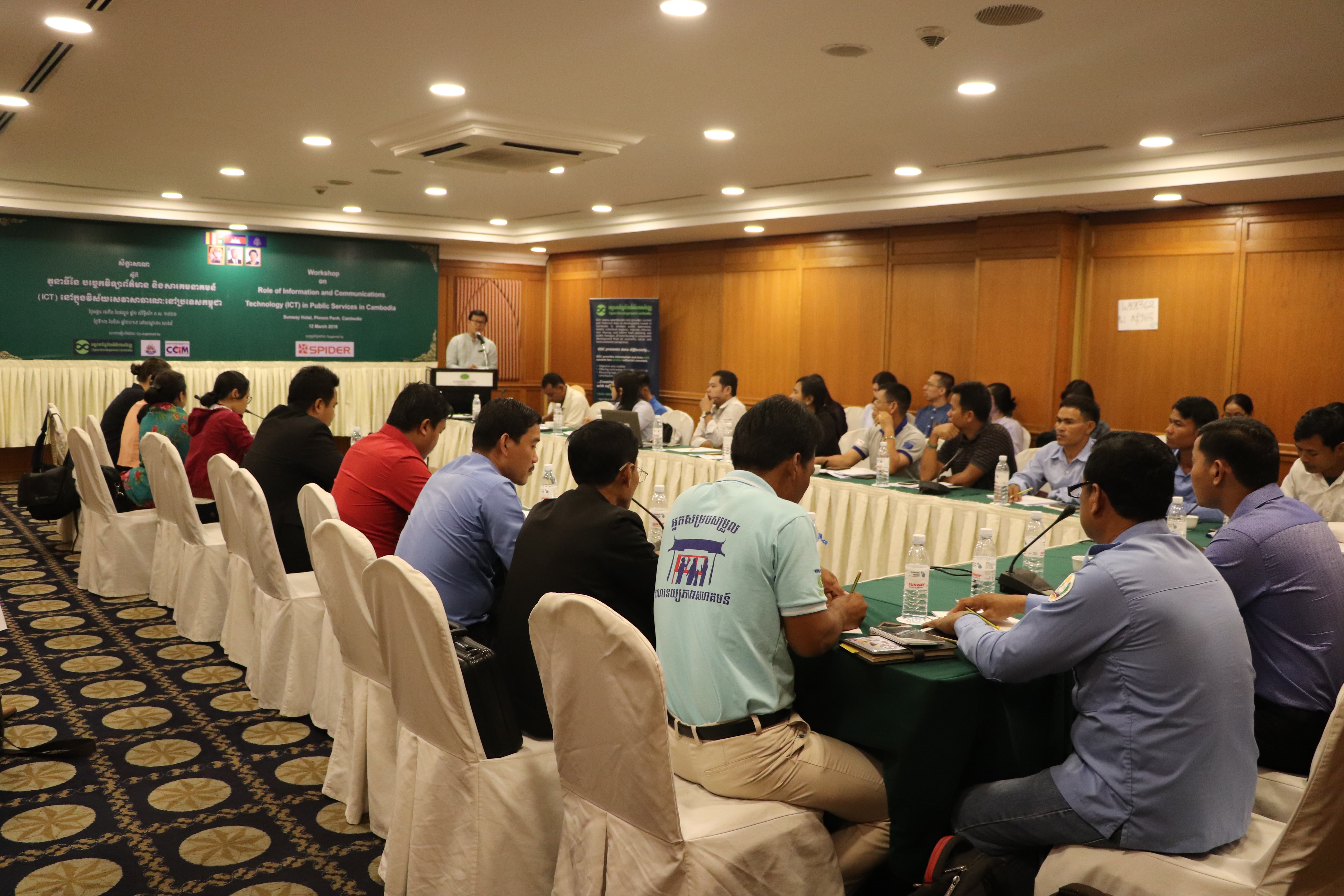
The workshop was started by an opening remark from Mr. THY Try, Editor-chief and Executive Director, Open Development Cambodia (ODC). He started his presentation by welcoming all the participants and expressing sincere gratitude to the donors and partners who support this project. Later, the background information about the initiation of this project was highlighted. Mr. Try raised about the difficulty of accessing the public service information in a traditional approach which requires the people to go to the commune office physically. Noticing the problem, he emphasized that ODC does not play the role of providing the public services, but provide information on those services for the benefit of the public, governments, and development partners. With this approach, ODC is contributing to improving public services by increasing the accessibility of the information. Mr. Try stated that the aim of today workshop which included a number of the panel discussion is for ODC as well as CSOs and other stakeholders to share their result in the mission of improving the public services.

The next session was followed by the project’s activities and achievements. Ms. OURN Vimoil, Editor-Researcher, starts her presentation by introducing a profile page on ODC website named access to public service information which stores information related to public services along with interactive map layers. Furthermore, she pointed out that during the project implementation in collaboration with various partners, 11 workshops, including this one, has been conducted and were participated by 180 participants coming from community, Community Accountability Facilitators (CAFs), and Citizen Journalists (CJ), who are the key persons in further distributed the information. In addition to organizing workshops, the team attended almost all BarCamp events.
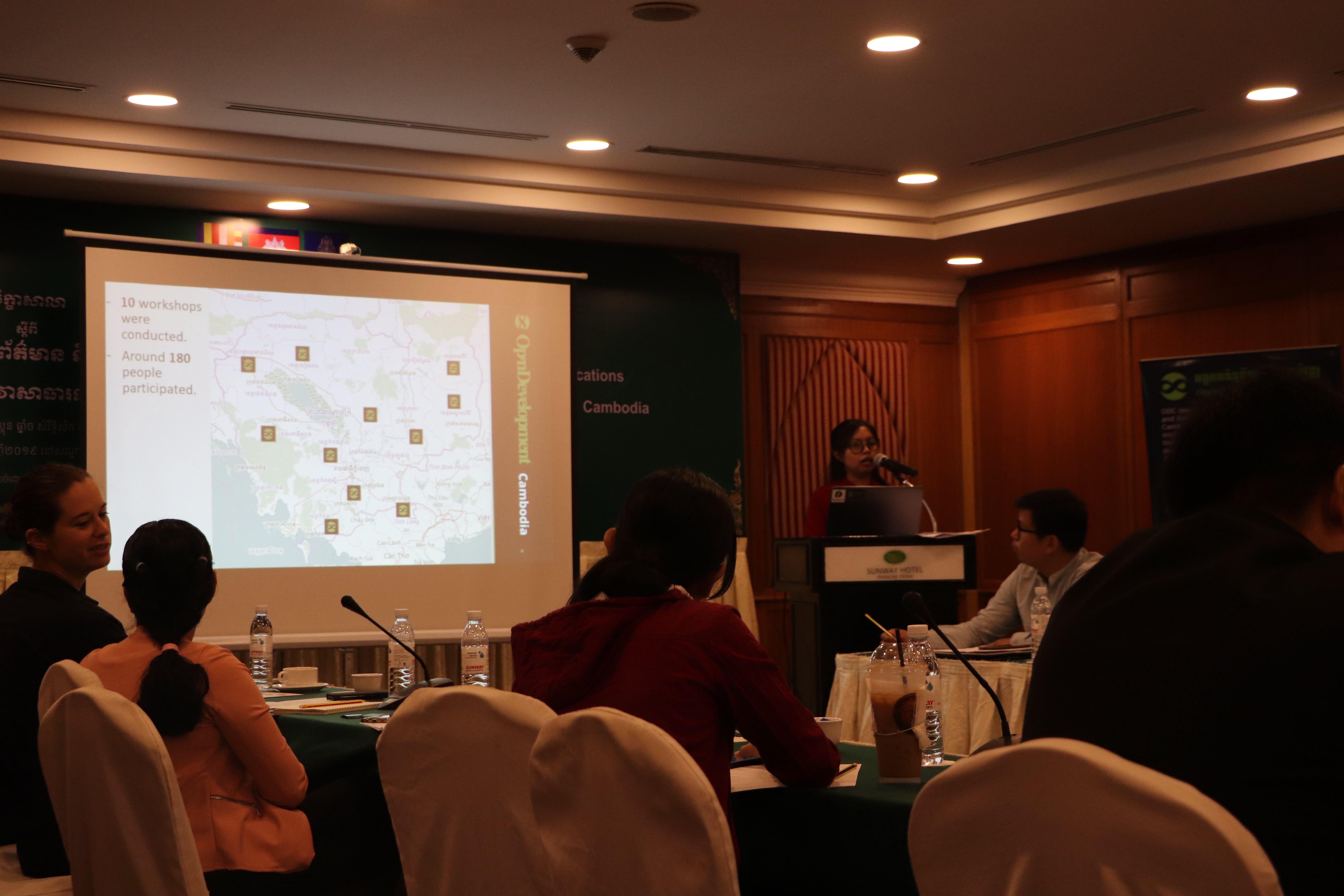
Another project’s activities and achievements were presented by Ms. DOCH Sotheavin, Research and Partnership Officer at ODC. The three organizations, ODC, CCIM, and STAR Kampuchea, work together to increase the knowledge about public services in both local communities and nationwide. While ODC is working on providing information and raising awareness on public service delivery, STAR Kampuchea focuses on social accountability of the commune in term of primary schools, health centers, and commune services. They work directly with the communities in 2 communes in Svay Rieng province. Meanwhile, the role of CCIM is to conduct the radio show and live the show on Facebook for discussion about the information related to public services.

After these two presentations, Mr. PRUM Punwath, Research and GIS Coordinator at ODC, conducted his presentation along with the demonstration of ODC website in mobile view. He started from introducing the URL of the site and navigate to the access to public service profile page. After landing on that page, he emphasized the variety of contents and the visualization of those information which is currently published on ODC website.
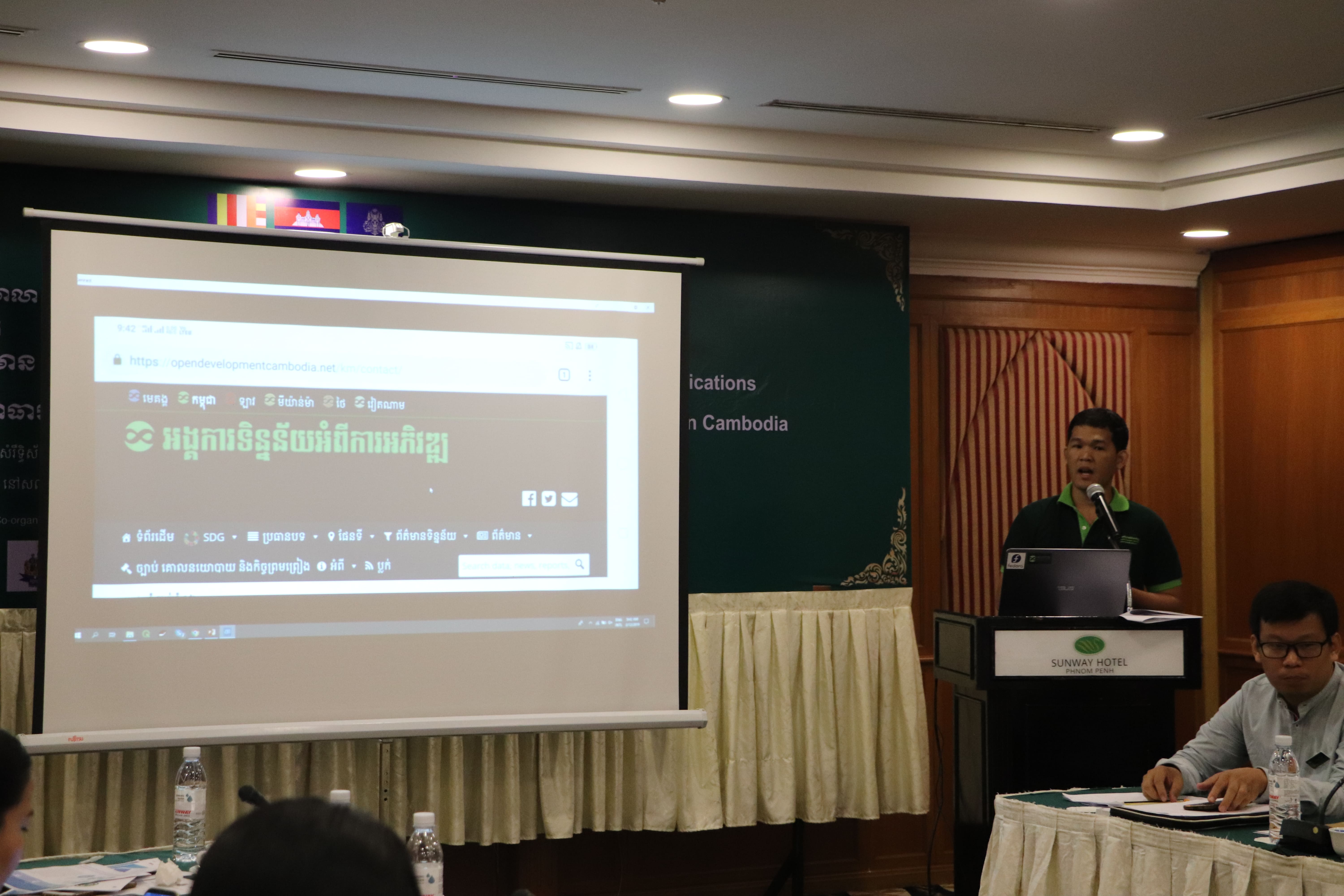
To make the workshop productive and get more engagement from various people, three panel discussions were designed with panelists from public and private sectors and civil society organizations. Before opening for questions, each panelist was invited to do a 10-minute presentation about their work related to the public service sector and ICT. The first panel discussion focused on the participation and role of ICT and civil society in promoting public services moderated by Mrs. CHET Charya, Executive Director of STAR Kampuchea and presented by 3 panelists namely Mr. SOPHA Ratana, Consultant on Online Outreach at FHI360 Cambodia, Mr. VORN Samphors, Country Director at Aide et Action International Cambodia (AeAI), and Mr. LAM Socheat, Executive Director at Advocacy and Policy Institute (API).
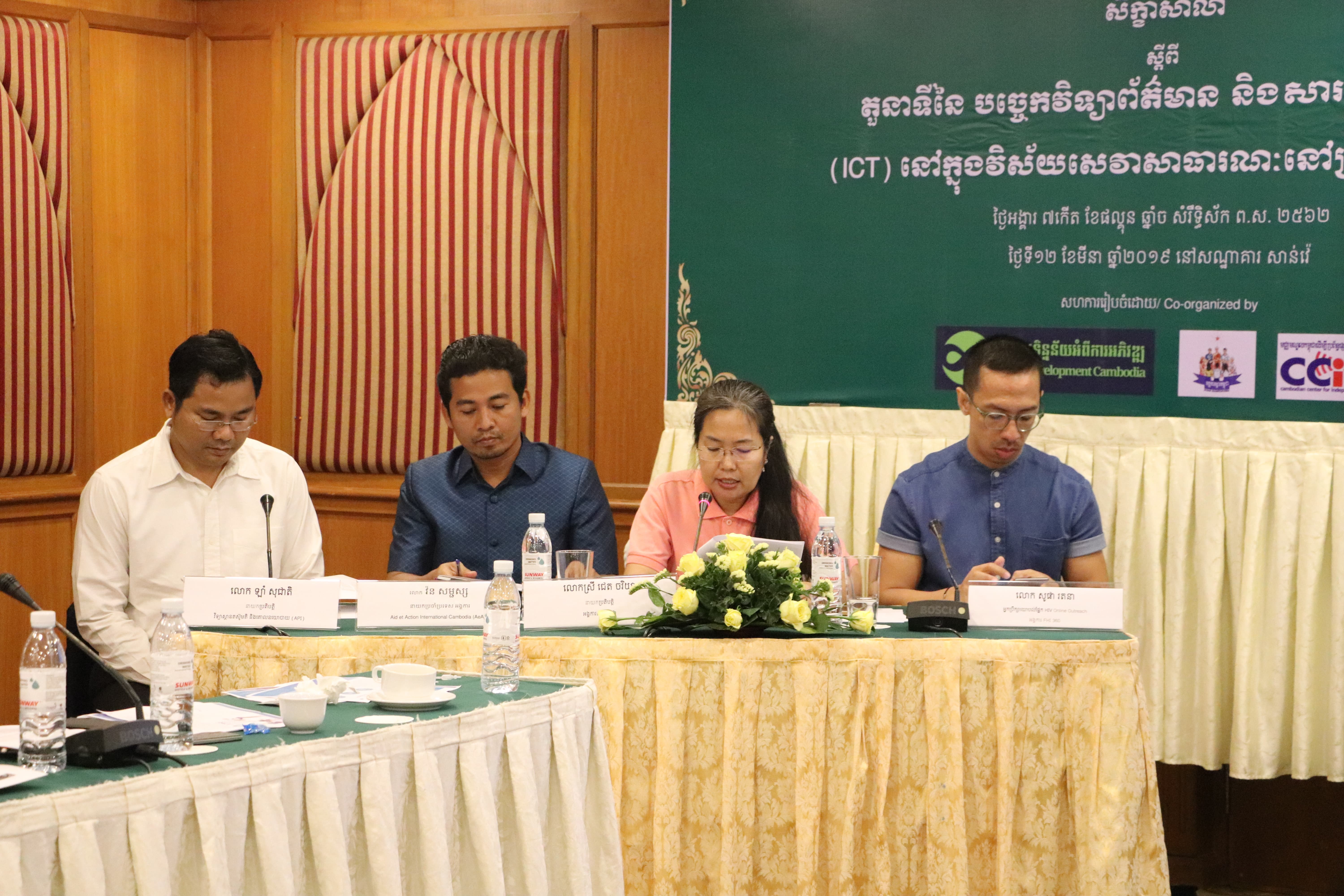
Mr. Ratana kicked off his presentation by providing some background information along with statistics which leads to the reason why HIV should be on the net. He built up his argument with the data about phone technology in supporting Khmer language and the behaviour of the Cambodian people on smartphone and social media, especially Facebook and Instagram. After that, he shared about the principle of going online which consists of 2 main things: (1) increase the number of people to reach out for the service and (2) shape the content of the message to meet the needs and the interest of the target group.
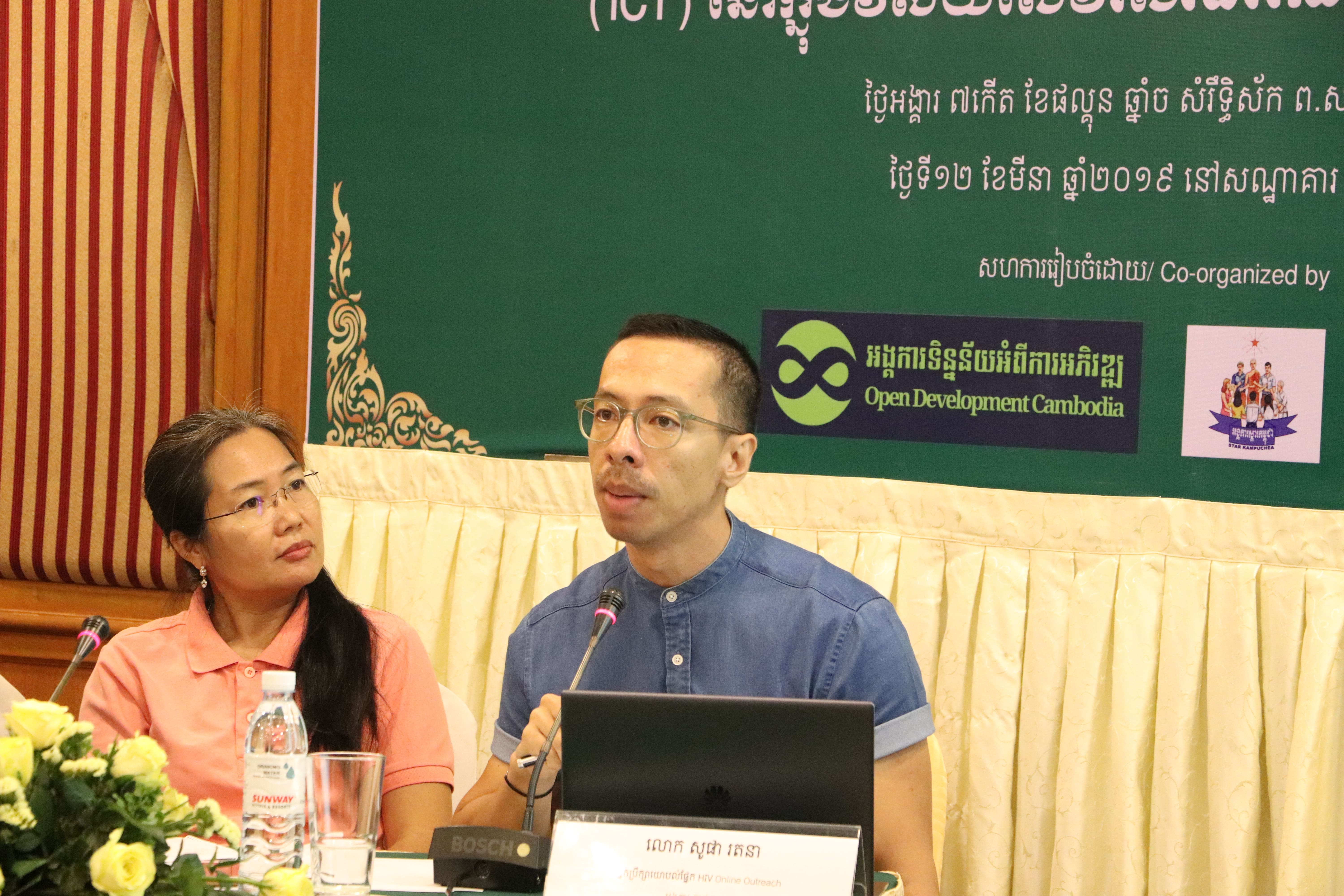
To highlight the importance of ICT in achieving the needs, Mr. Samphos emphasized some significant challenges of traditional physical libraries such as the damage of the physical resource due to time, and the hardship in distributed the resource. He considered this approach unsustainable. Thus, the ICT is needed to be integrated in order to establish a sustainable knowledge bank. With this intention, he raised about the Banalay Khmer project, which is the blend of a physical and digital library, under collaboration with Sipar. In the course of project implementation, an interactive reading application called Khmer Rean An (Khmer Learn to Read) and an application for Khmer author called Khmer Writer was developed. He also pointed out on how ICT ease the interaction despite the challenge of the distance between parents, school, and administration level by letting them connect to each other remotely.
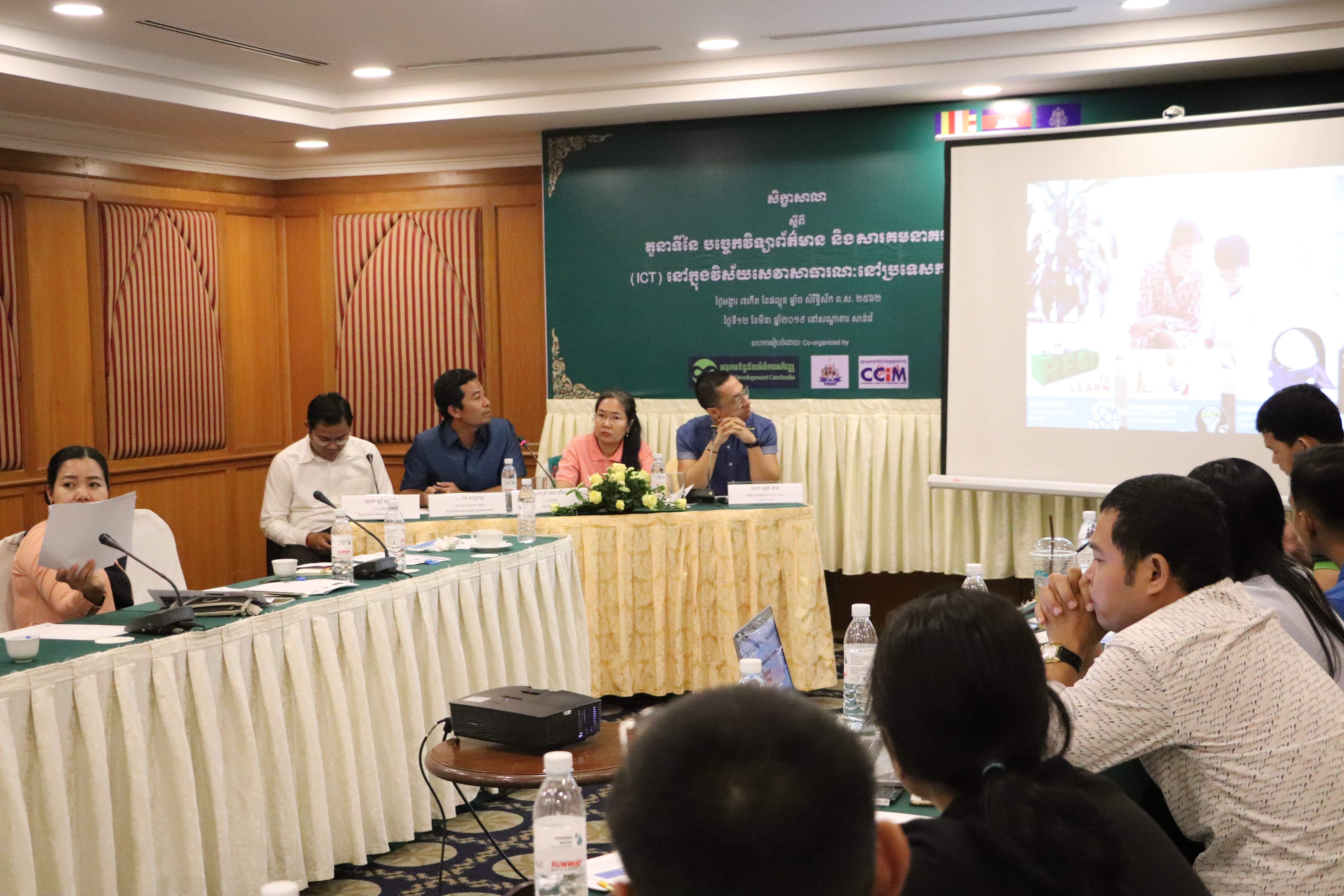
Mr. Socheat commenced his presentation by introducing about the work of his organization including good governance (communes, districts and I-SAF), people right to access information, and increase of ability in debating at a community level. He emphasized that the work supports both service provider and service users to encourage the supply site to provide services based on the needs of the demand site. Currently, the work focus on allowing people to give scores on the service provided by the commune’s and district’s education and health service as well as the police officer. The ICT tool selected for implementing this project is social media, especially Facebook. He stated that Facebook had become a place for the governance to share their activities and achievement and for the citizens to ask questions and make a request.
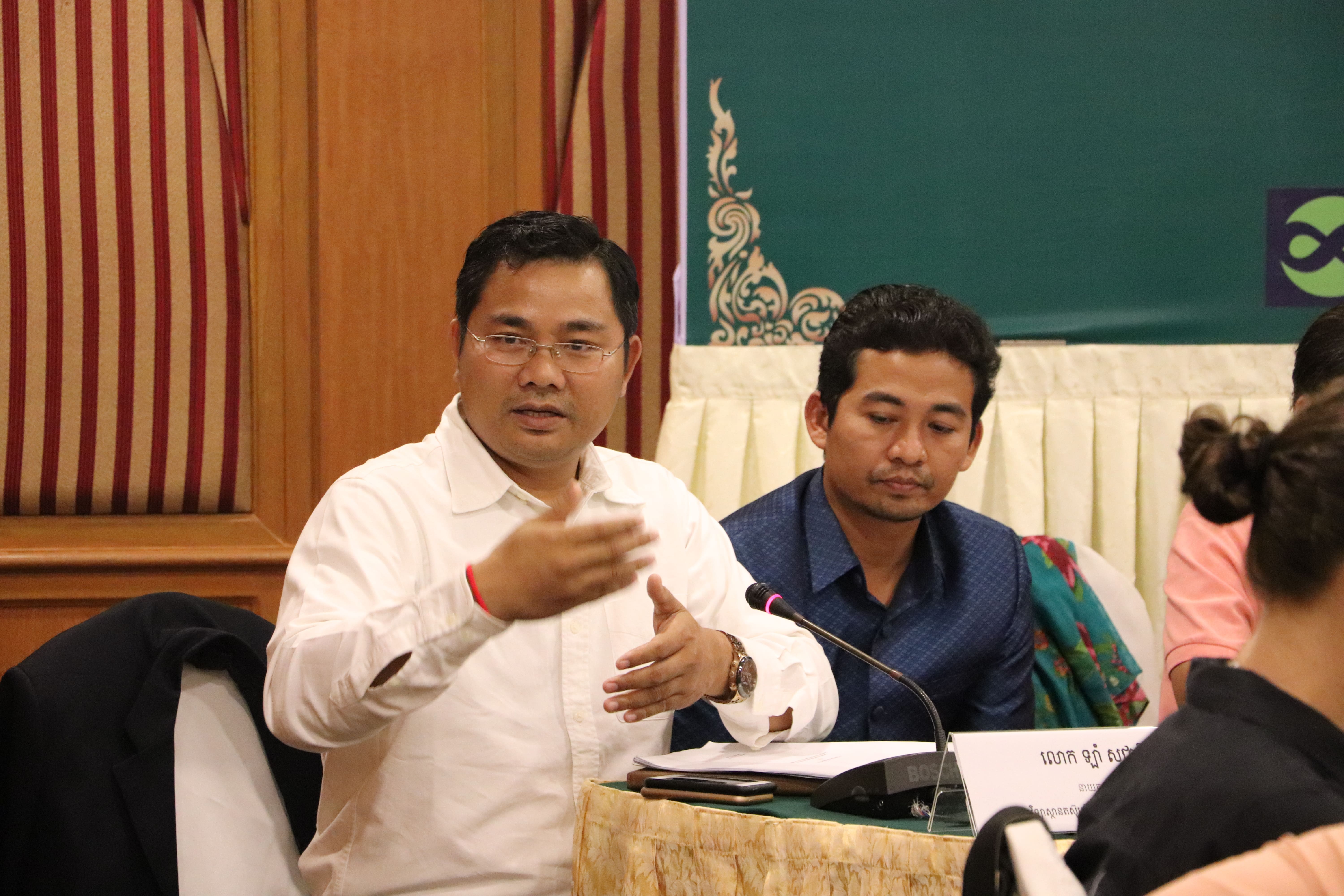
After hearing stories from civil society, the next panel discussion was contributed by Liza ORDONEZ, Co-Founder of GoGreen Cambodia and Mr. PAUL Amereth Kethya, Deputy Director of Department of Public Service of the Ministry of Civil Service while Mr. MAK Puthea, Cambodia ICT4D network coordinator is a moderator. This session focused on the engagement of social entrepreneurship/startup in promoting public service and mobile apps to provide public service information.
Ms. Liza starts her presentation by talking about the waste issue and plastic pollution in Cambodia and around the world and narrow down to Phnom Penh with figures from different reports related to trash and landfill. Then she mentions about the bad impact of the waste issue on the daily life of people and the ecosystem. Following her introduction, she recalled the initiation of GoGreen in calling for people who are interested in doing clean up activity which is not the ideal solution, but it is the first step for triggering people’s ideas on what to do to deal with the issue. GoGreen Cambodia inserted the role of ICT into their project by developing a pilot Android mobile application which is financially and technically supported by InStedd iLab Asia. The application plays a role as the tool for giving people a voice to talk about the waste issue and provide the information to the related stakeholder.
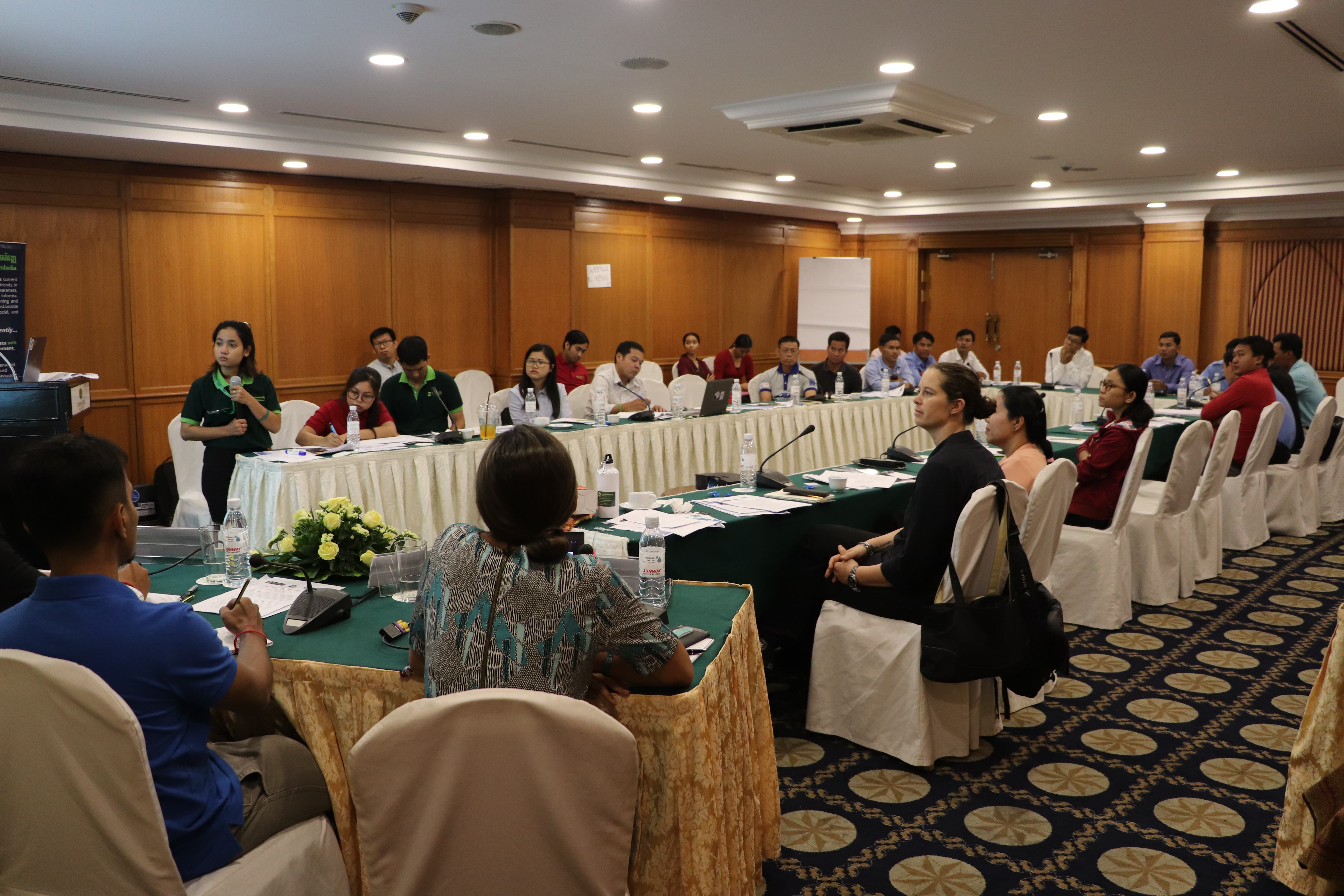
Mr. Kethya started his presentation by highlighting that the Public Service mobile application is initiated by the governments and developed by NIPTICT and is available on both Android and iOS. This application is developed in order to be a cheaper way of distributing information about public service since it is an alternative to printing books. This application contains information of 27 institutions, 315 services, and 106 service groups. One of the main advantages is that the application can be used offline and requires an internet connection only when the information is updated.
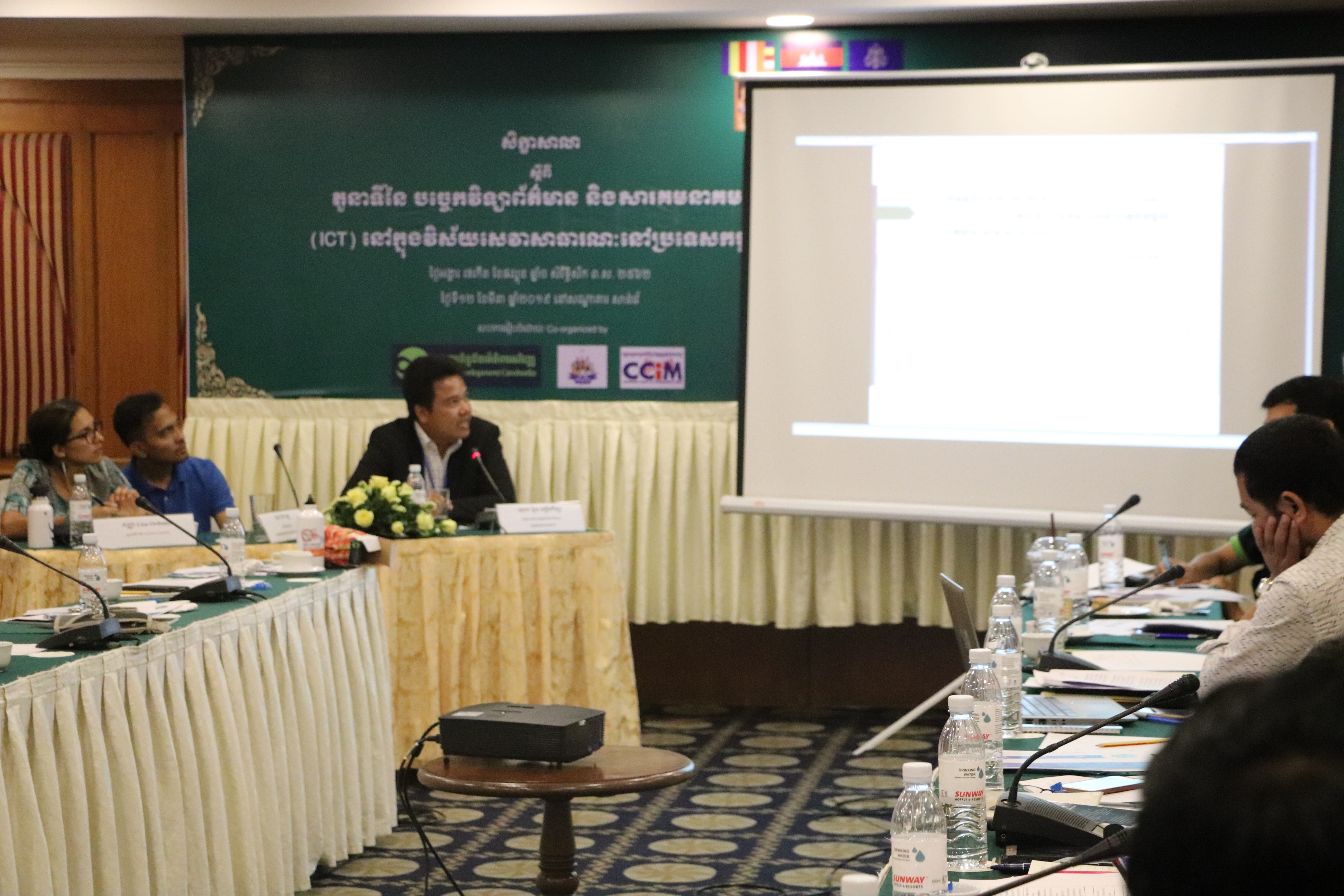
In the afternoon after the lunch break and before the next panel discussion, group discussion was included in the agenda to boost the energy of the participants. All the participants were divided into 4 groups to discuss on 4 questions related to public services. Those questions are:
- Please list down the public institutions, NGOs and private sectors working on providing information related to public service.
- What is the ICT tools related to public service that you are using?
- What are the challenges you have encountered when using those existing ICT tool?
- What mobile application would you like to have to improve access to public service?

The last panel discussion was presented by 3 representatives from 3 ministries, namely Ministry of Posts and Telecommunications, Ministry of Public Work and Transport, and National Committee for Sub-National Democratic Development (NCDD). The discussion focused on access to public services through E-government.
Mr. CHET Kimchung, Deputy Director of Monitoring Evaluation and Information Division of NCDD started by introducing to NCDD website and NCDD database which is available in both Khmer and English language. The databases fall into 2 categories: public database (8 databases) and internal use (2 databases). Next, he presented about I-SAF which is the main content of his presentation topic. His presentation was conducted along with website demonstration. He showed the cycle of annual accountability activities as well as the steps in collect data, entry data, publish post-on, and officially post the post-on on the wall, which are the tasks of district and commune authority while the result is publicly published for the citizens.
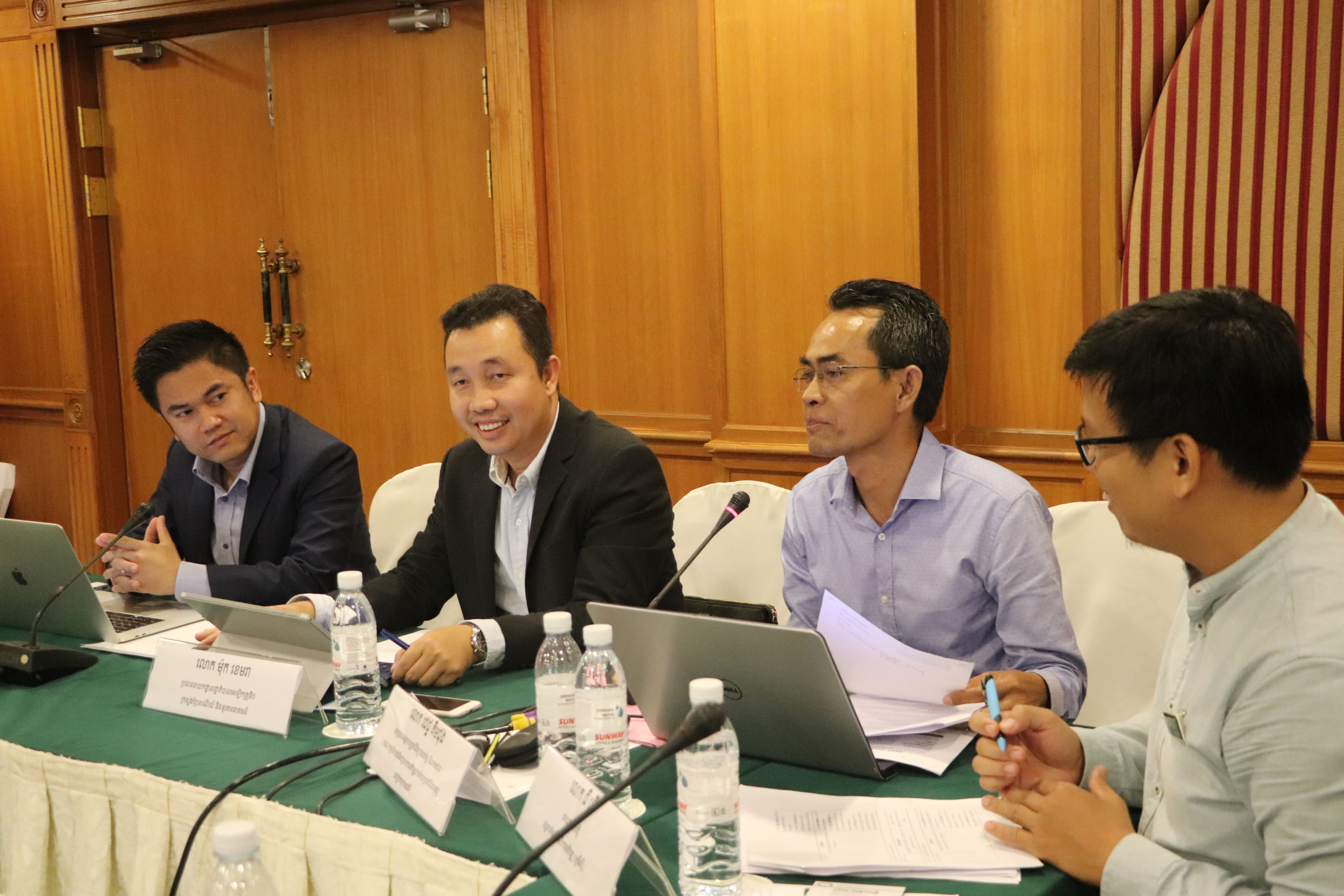
Mr. HEANG Sotheayuth, Director of IT and Public Relation Department at the Ministry of Public Works and Transport, started his presentation with the task that the ministry had achieved. He stated that since the middle of the fifth mandate, the ministry started focusing on adopting ICT to improve the transparency, affordability and availability which firstly focus on land transport. Then he presented the ICT tools developed by the ministry as follow:

Unlike the presentation of the two previous panelists, Mr. MOK Khemera, Director of Department of e-Government at the Ministry of Posts and Telecommunications focused less on technical and more on policy. He took a bit of time to mention about the www.service.gov.kh / www.seva.gov.kh which is the website providing information about public services. He informed the participants of the workshop that while all ministries have their own website for sharing information, all existing capital and provincial websites is technically supported by the Ministry to Posts and Telecommunication.
After that, he presented about the four steps of 2016-2023 e-governance development such as emerging presence, enhanced presence, transactional presence and networked/integrated presence. He continued his presentation by sharing the vision of e-governance 2024 which focus on enhancing the e-governance to improving the effectiveness, efficiency and transparency of administrative work, delivery of public service, and public decision which is the main factor in economic and social development.

The participants actively engaged in the workshop. After each presentation, they expressed their interests by raising questions or giving comments to the panelists, while the presenters were delighted to share their knowledge and experience in each sector.

To express our sincere thanks to the panelists and moderators who were willing to contribute their valuable time to make the workshop happen, Open Development Cambodia prepared small gifts (reusable bottle and krama scarf) for them.


